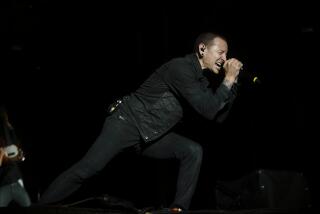Kirov Opera is right at home in the czar vehicle ‘Godunov’
Following a nonstop week of performing Wagner’s epic “Ring” and three epic Shostakovich concerts, the Kirov Opera and its orchestra, led by the indefatigable Valery Gergiev, spent day eight of the Mariinsky Festival in Orange County mounting another epic: “Boris Godunov.” If it’s Friday, it must be Mussorgsky.
Perhaps to make it slightly easier on the company, Gergiev selected the sleek, original 1869 version of this quintessential Russian opera, which was presented without an intermission and lasted only a bit over two hours in Gergiev’s driven interpretation. Or maybe the idea was merely to cram as many performances of Mussorgsky’s masterpiece as possible into a weekend -- the production was mounted three more times Saturday and Sunday in the Segerstrom Hall of the Orange County Performing Arts Center.
“Boris” -- the gripping recounting of the Russian czar who murdered his way into power, ruled wisely but fell victim to his own conscience along with the schemes of church and state -- exists in many forms. In the first, Mussorgsky condensed Pushkin’s panoramic play about the czar down to seven tight scenes, but the composer remained faithful to the text.
The telescoping, along with Mussorgsky’s harsh harmonies and radical use of naturalist folk style, proved too unrelenting for audiences of 1869. Worse, it had no major role for a woman. Several years later, Mussorgsky greatly expanded the opera, making it far grander and adding a scene in Poland for the pretender to the throne and throwing in some love interest.
The revised opera, which was fully rewritten, is better than the original, but it is also more conventionally expansive. A dynamic presentation of the 1869 version, an intent psychological study of the corruption of power, can have a unique forcefulness and relevancy, as it often did Friday.
The production, from 2002, has a set and concept by George Tsypin. He also designed and contributed to the concept of the Kirov’s “Ring,” but this time there was, at least, a director, Victor Kramer. Tsypin’s is a curious vision. He has taken Mussorgsky at his most naturalistic and made him fantastical, creating an aquatic “Boris.”
The stage is confined by pillars encrusted with starfish, pearls and fish scales. The onion domes of the Russian landscape are transformed into globular, urchin-like bulbs. Boris and his court are dressed in crisp naval whites. The scheming boyars are encased in hard shells, like deep-sea divers. Lighting gives everything a polluted glow.
The opera famously ends with Boris dying in hallucinogenic dementia, and you can very well see why. No one could keep his sanity for long trapped in this toxic otherworld.
There is no bass baritone role in opera more monumentally rewarding than that of the tormented Boris, who tries to accomplish good but is haunted by his past and faced with crises, such as famine, beyond his control. He is loving father, wise ruler, tortured soul. Friday, Vladimir Ognovenko’s Boris (he shared the role with Nikolai Putilin over the weekend) was empathetic but not regal. His voice is neither large nor darkly deep. He might have been a businessman hounded by creditors or a modern politician ensconced in scandal.
In many ways the most effective singing came from the Kirov chorus, which could be overwhelming in its angry, moving anthems to the czar. But Gennady Bezzubenkov proved the kind of rich, ringing Russian bass just right for the monk Pimen. Oleg Balashov was a vigorous Grigory, the pretender to the throne, a small role here but greatly developed in the revised opera.
The folk-song arias sung by the wet nurse (Nadezhda Vassilieva) and the drunken, itinerant monk Varlaam (Mikhail Petrenko, fresh-sounding even after singing Wagner on Wednesday and Shostakovich on Thursday) were utterly natural. Nikolai Gassiev as the shifty Shuisky, the leader of the devious boyars, was properly slimy.
“Boris” is, in other words, in the Kirov’s bones.
Still, as had often been the case during the Kirov’s residency, the company gets away with murder.
The production did not feel as ad hoc as had the “Ring,” but its mounting still felt too quickly thrown on the stage. This time Tsypin’s set fit the narrow surroundings slightly better. Not quite so large an orchestra as Wagner’s needed to fit into Segerstrom’s small pit. And by what seemed like the sheer power of will, Gergiev made his orchestra bloom in the acoustically uneven venue.
But, once more, he seemed to be pacing himself. Obviously, with such a workload he must, but anyone who has seen this great conductor completely let go could sense a certain treadmill restraint. The bells of the coronation scene did ring tremendously, and Boris’ death was spellbinding. But this wasn’t 100% Kirov, 100% of the time.
This week, a new orchestra comes in as the Mariinsky Festival turns to ballet. Meanwhile Gergiev and his orchestra, eternal wanderers, once more hit the road. Tonight they play in Berkeley, Tuesday, Seattle and Wednesday, Vancouver, Canada -- and all the repertory is different from what they performed last week in their Orange County marathon. Next week, they finish a Shostakovich symphony cycle in New York. How long can they keep this up?
More to Read
The biggest entertainment stories
Get our big stories about Hollywood, film, television, music, arts, culture and more right in your inbox as soon as they publish.
You may occasionally receive promotional content from the Los Angeles Times.











